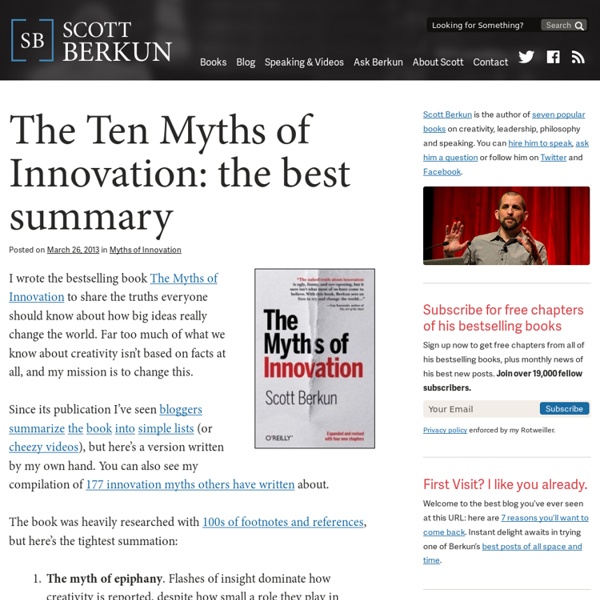The Ten Myths of Innovation: the best summary
I wrote the bestselling book The Myths of Innovation to share the truths everyone should know about how big ideas really change the world. Far too much of what we know about creativity isn’t based on facts at all, and my mission is to change this. Since its publication I’ve seen bloggers summarize the book into simple lists (or cheezy videos), but here’s a version written by my own hand. You can also see my compilation of 177 innovation myths others have written about. The book was heavily researched with 100s of footnotes and references, but here’s the tightest summation: The myth of epiphany. If you liked this summary, please get the book.
teh_aimee : Hubbub at #swwlg :)...
DownLinc : Nice job @teh_aimee pitching...
| MixTape by Atomic Droplet
teh_aimee : Good Good Wonderful at #swwlg,...
TomMitchell : 'General badass' @teh_aimee...
Looking For Customers? Be A Hunter, Not A Gatherer ⚙ Co
You've come up with a great business idea, teamed up with trusted cofounders, registered your URL, thrown up your minimum viable product in WordPress, and emailed your link to a few VC friends to "gauge their thoughts." Now sit back, refresh your analytics dashboard, and wait for customers to sign up. Right? No matter how good your product is, customers aren’t just going to magically start knocking at your door. We’re often asked how we went found our first 10 customers, and then found the next 100, so we thought it’d be worthwhile to summarize our findings. 1. You've done in-depth customer research to hypothesize who your archetypal customers might be. Go through your address book, search your Evernote and email archive by subject, and check your LinkedIn connections in the industry you're targeting. Visit the websites of relevant industry associations and conferences to mine lists of members and attendees. 2. You can also add columns that help you prioritize your outreach. 3. 4. 5.
Up!, Second Skin and #hack4good
Posted by on 27 August 2013 | Comments Up! Shoutout for a friend: lovely chap (and available-for-business photographer!) Matt Evans is just finishing up his 100day project, which focuses on clouds (predominantly in the Wellington region). So pretty :) Second Skin Madrid-based photographer Miguel Vallinas' ongoing series of portraits - 'Segunda Pieles' (Second Skin) - featuring the stunning sartorial efforts of a wide range animals is breathtaking. #hack4good Fuck yeah social enterprise! BMW R75/6 by Maria Motorcycles Another pin added to my bikes board. Kevin Spacey Delivers the Definitive Wake Up Call to Anti-Tech TV Execs The man continues to be a legend. Governing CRIs So I do think innovation is a critical issue for CRI boards to take more leadership on. Fellow Sciblogger Robert Dickson latest blog post "considers what role do and should the Boards of Directors of New Zealand’s Crown Research Institutes play in innovation." World stunned by girl in underwear at MTV Video Music Awards
The Twelve Gifts of Christmas, Startup Weekend Edition | Startup Weekend Wellington
The silly season is in full swing and the Christmas spirit has us rolling around in pine needles with everyone’s favourite jolly old man – Santa Claus! We sat down with the old chap to have a chat about this year’s wish lists. Assuming they’ve all been good this year, we understand it can be a right pain to shop for a particular (and likely stubborn) breed of professionals, so here’s our list of the top 12 terribly thoughtful and seriously kickass offerings for the Startup Weekender(s) in your life. These gifts will spread ALL the cheer! 12. The fuel for any sane (well, ‘sane’) Startup Weekender deserves a spacious abode and always should be served cold. Argos.co.uk (check YouShop for UK forwarding) 11. Power naps are essential for any hard-working SWer but, sometimes, finding the appropriate time and place can be difficult. Studio Banana Things 10. Kanban-For-1 9. The ultimate combination for the SWer who appreciates fine tunes played at maximum decibels…or always wanted to be a rockstar!
Related:
Related:



